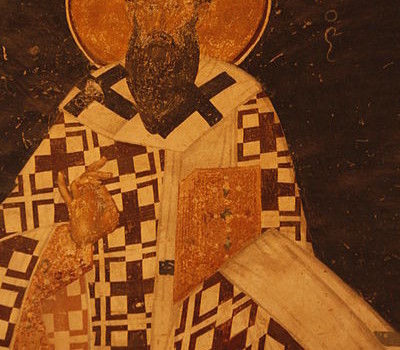
 Basil was born in Caesarea, Cappadocia — part of modern-day Turkey. An intellectual, Basil was initially led into the secular world as a young man. Through the influence of his sister St. Macrina, and the grace of the Holy Spirit, Basil left a promising law career to devote his life to the service of Christ. He began a monastic community in 364 which became the model of monastic living for centuries.
Basil was born in Caesarea, Cappadocia — part of modern-day Turkey. An intellectual, Basil was initially led into the secular world as a young man. Through the influence of his sister St. Macrina, and the grace of the Holy Spirit, Basil left a promising law career to devote his life to the service of Christ. He began a monastic community in 364 which became the model of monastic living for centuries.
A good model of fidelity for today’s current crisis, Basil was a man of great personal holiness who fought against the heresies creeping through the Church during his time. Ordained a bishop in 370, he enabled the reform of priests and other religious, including a commitment to orthodoxy and a strong religious discipline among the clergy. He was responsible for the promulgation of the Nicene Creed to the faithful and the victory over Arianism at the Council of Constantinople.
Basil is the author of a great number of works left to the care of the Church, including a beautiful discourse on the Holy Spirit which helped form Catholic doctrine. His deep spirituality was signified in his great acts of charity including work with the poor, sick, hungry, and homeless.
He died in 379 and is the patron of hospital administrators. St. Basil earned the title of “Great” during his lifetime and was made a Doctor of the Church after his death.
Lessons
1. Blessed Teresa of Calcutta once remarked that God does not call us to be successful, He calls us to be faithful. Although a career as a lawyer may have brought Basil worldly success, he was able to discern his calling to serve Christ as a “faithful” success not measured by earthly standards.
2. Basil, who loved the priesthood and sought to preserve the Church from heresy, was passionate about bringing those who left the faith back home. His desire for their communion was balanced with a fraternal judgment for their offenses — a balance not easily understood nor achieved in modern evangelization efforts.
3. In our current political responsibilities, it is important to keep mindful of what our Lord expects of us: As St. Basil wrote, “It is right to submit to higher authority whenever a command of God would not be violated.”










